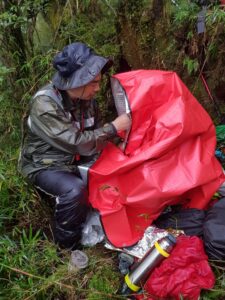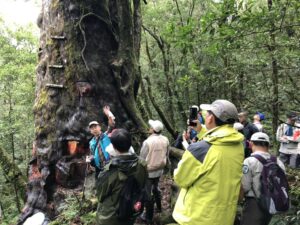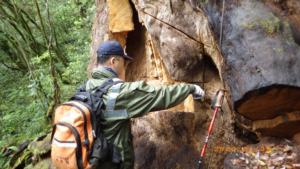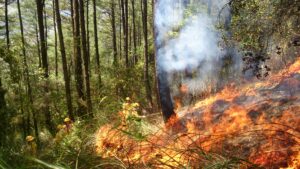Reporter/Lee-Xian Ying
Mountains cover 60% of Taiwan’s land area, giving it the greatest concentration of high mountains of any island in the world. In fact, Taiwan is covered by lush evergreen forest, with over 1,000 hectares of lands managed by the Forestry Bureau. However, there are only 1,100 forest rangers patrolling the vast forests of the island, which means each forest ranger needs to oversee more than one hectare of forest. “One hectare of flat land is not that big, but one hectare of forest is more burdensome as it includes mountains and rivers,” said Lai, Po-Shu, a forest ranger stationed at Taipingshan in Luodong, Ilan County, northeastern Taiwan.
Lai has been protecting the forest treasures and immersing himself in the vitality of the forest for nearly 30 years since 1994. He has been recognized for his excellent work as a forest ranger, receiving Outstanding Forest Ranger of the Year Award in both 2006 and 2020. According to Lai, the job of a forest ranger encompasses various responsibilities, including forest protection, forest management, illegal logging cases reporting, animal and plant resource surveying and wildlife restoration. Furthermore, forest rangers are often required to act as firefighters to extinguish wildfire and as rescuers to save the lives of missing or injured hikers in the forests. Lai mentioned that rescue operations have increased due to an increase in mountain disaster incidents after the government lifted access restrictions on Taiwan’s mountain and forest areas.

Forest rangers also serve as tour guides, sharing the hidden secrets of nature with the public. Despite constant threats to their lives and the wide range of tasks they are required to perform, park ranger like Lai still approaches the forest with enthusiasm and energy every day.

Lai works at Taipingshan Ranger Station which he describes as a “mini monitoring center” situated in the forest. His daily schedule varies, depending on factors such as his health condition, weather condition and the situation of the forest he monitors. Basically, his job responsibilities can be divided into two categories: group work and personal work. Lai emphasized that Taipingshan is a high-risk area where illegal logging cases frequently occur. So, Lai prioritizes routine patrols with his colleagues to monitor areas prone to illegal logging at the beginning of each day. Afterwards, he focuses on other personal tasks, such as recording tree growth performance and wood quality. On rainy days, when it is not suitable to patrol the forest, Lai adjusts his tasks accordingly. For example, he supervises the forests through surveillance cameras at the center instead of engaging in outdoor activities.
“Every day is highly unpredictable in the forest,” Lai said. He must be well prepared at all times to overcome obstacles he faced in the natural environment. As a result, he carries various pieces of equipment before entering the forest, including radio, GPS, refreshments, first aid kit, belt knife and headlamps. Lai explained that radio and GPS are necessary because there is no signal or internet access deep in the mountains. He also emphasized the importance of carrying refreshments since he does not know how long he will be in the forest.
Visible and Invisible Risks
“Visible risks are fearful, but invisible risks are even more horrifying as they can’t be completely prevented or avoided,” mentioned Lai when sharing his venturesome experience being a forest ranger for 30 years. Lai explained that illegal logging activities carried out by poachers, commonly known as “mountain rats,” have been evolving. They now operate in teams engaging in logging, transporting, and selling, which pose a threat to Taiwan’s natural resources. They even masquerade as hikers to avoid detection by forest rangers and maintain their illegal timber business. Consequently, Lai must remain alert during forest patrols, utilizing all his senses. He carefully observes their responses, facial expressions, and even their body odor, as cypress wood emits a distinctive smell. Yet, “mountain rats” are challenging adversaries, often armed with weapons and involved in drug-related activities while forest rangers only have belt knives. Lai’s course of action is to remember their physical characteristics and report them to the police as prioritizing life and safety is paramount.

Lai mentioned that visible dangers like wildland fire, “mountain rats” are observable and can be addressed. However, there are also challenges that go unnoticed, for example, the effects of high altitude of the forest, which may cause symptoms like vomiting, exhaustion, and other illnesses, as well as the presence of thorns and hidden animals in the mountains. Lai shared a dreadful experience when he and his colleagues patrolled the forest without detecting a snake above them, as the color of the snake blended seamlessly with the natural environment. It was after completing their patrol that they became aware of its presence. “Luckily, our patrol did not disturb it. I can’t imagine what would happen otherwise,” said Lai. In short, these unexpected “surprises” are part of Lai’s daily routine.
Boosting the Morale of Forest Rangers
With the increasing workload of forest rangers, Lai pointed out that it is impossible to increase the number of forest rangers due to budget constraints. To overcome this problem, the ranger station seeks volunteers who fulfill specific qualifications, including a love for forest and hiking experience. The ranger station provides education and training, such as the forest act and physical training, using a senior-junior system. Lai added that the volunteers receive an allowance once they complete their tasks.

Regarding the allowance of forest rangers, Liao, Shu-Chen, supervisor of Taipingshan Ranger Station in Luodong, said that the Forestry Bureau’s superiors have been working hard for almost ten years to secure operational costs. Finally, the application was approved by the government, ensuring that every forest ranger will receive the operational costs according to their tasks assigned instead of a basic salary and allowance.
Despite the workload of forest rangers, which includes both indoor and outdoor activities, Lai humorously replied, “I rejoice in the varied job scopes of forest rangers, which prevent tediousness.” For Lai, immersing himself in the forests is not a burdensome job, but a priceless opportunity to feel the vibe of nature. “Every mission broadens my perspective and teaches me something new,” said Lai. He stressed that he will continue to contribute to the forest against all odds until the day he retires.

Behind every success lies unseen hard work, sacrifice, and persistence. The preciousness and prosperity of Taiwan’s natural beauty will not endure on its own but through the dedication of forest guardians at the forefront of forest protection. Their commitment and enthusiasm are greatly appreciated, and the government should prioritize their working environment and welfare as a sign of respect.


